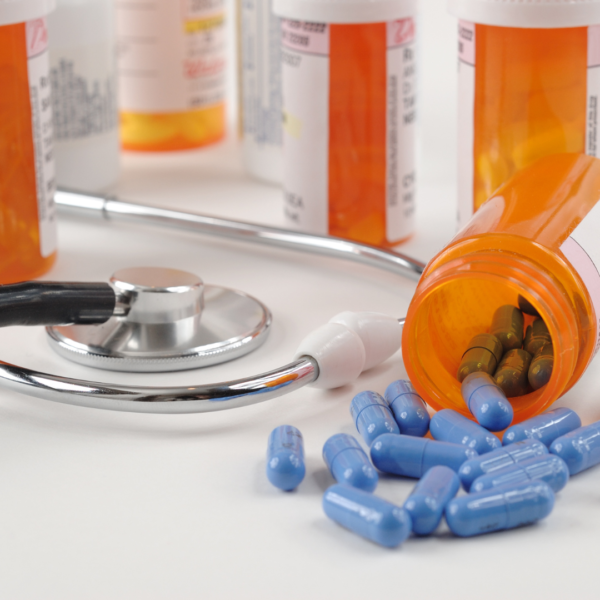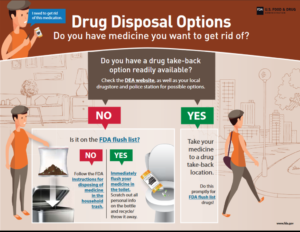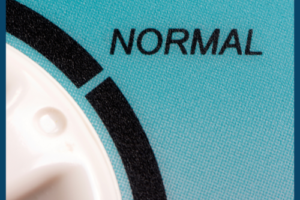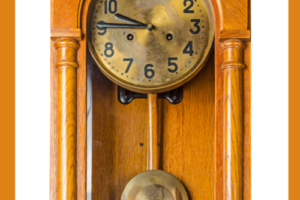
5 Keys to Easily Organize Your Medicines and Supplements
“100 bottles of pills in the house, 100 bottles of pills, pick one up, take the last one, 99 bottles of pills in the house.”
Don’t worry, I’m not going to continue with the song! 😊
Instead, I’m going to address how to manage the chaos of medicine clutter.
Prescriptions, common over-the-counter (OTC) products, supplements.*
Where do you keep them?
My guess is that they are scattered between the kitchen, a bathroom, and some random cabinet. Your ability to find medicine when you need it is important and shouldn’t be left to chance.
Medicines taken incorrectly can be ineffective or even dangerous.
PERCEPTION vs. TRUTH
| Perception | Truth |
|
Someone you know had bad side effects from the same or similar medication, so you decide not to take it.
|
It’s very important to know potential adverse reactions and report them to your medical professional. However, prescriptions effect people in different ways, hence side effects vary as well. HealthInAging.org discusses why medications often work differently in older adults, both in their effectiveness and side effects.
|
|
If the label says “natural” then the product must be better and safer.
|
In the United States, the Food & Drug Administration (FDA) does not have any authority over dietary supplements until after they are on the market. If you’re in another country, please check their policies.
|
|
The medicinal product must be safe and effective because people say so on TV.
|
Many people who endorse products on TV are paid.
|
|
It’s okay to stop taking a prescription if I don’t see any difference or as soon as I feel better.
|
If the directions say to finish the medication, then there is a reason to do so. Not doing so may cause the condition to reoccur.
|
|
I don’t need to be worried about the type or quantity of dietary supplements that I take.
|
The U.S. FDA identifies several reasons why there might be a side effect or negative reaction, including mixing supplements and medications, as well as taking too many vitamins.
|
|
It’s not a problem if I miss a dose or two of my prescription.
|
It depends on the medication; check with the prescriber.
|
|
Dietary supplements can solve many health issues.
|
The National Center for Health Research states that there are many false and misleading claims about the effectiveness and safety of dietary supplements. They may be useful, but make sure you’ll fully informed about the product.
|
|
A higher dosage of an OTC will make the pain go away faster.
|
Some OTC pain relievers, if taken in excess, may put someone at a higher risk of liver damage. It can also increase the likelihood of any side effects listed on the packaging.
|
There are other repercussions of not having an organized routine for taking medicinal products, in addition to those already been mentioned in this article. Poison Control states that accidents are often the result of taking a medication twice. Using the prescription of another family member because the bottle or pill looks similar is also a problem. It’s easy to consume the wrong dosage (two tablespoons instead of two teaspoons). It’s also possible to take multiple OTC’s with similar ingredients at the same time.
Bottomline, not taking medicinal products correctly means it may take longer to feel better and even that the situation could become worse.
Here are five keys to easily organize your medicinal products:
Storage. Many medications need to be stored in a cool, dry, and sometimes dark area. This means that a humid bathroom is out for long-term medicine storage. You might use a piece of furniture such as a wardrobe or shoe pockets on a door. Make sure everything is clearly labeled and child-proof lids are available, if applicable. I created a habit to use a permanent pen and abbreviate the product name and purchase date on the top. Although it takes an extra minute at the beginning, It saves time when I need it. I don’t have to pick up every bottle to locate the right one.
Usage. Directions for taking medication can be confusing, contradictory, and inconvenient. But when taken in the wrong conditions, medicine may lose its effectiveness. Here are a couple of details to be aware of:
- Know all potential interactions whether you are taking prescriptions, OTC’s, supplements, herbal remedies, or a combination. For instance, some dietary supplements may cause skin sensitivity and severe reactions if taken during radiation treatments. Similarly, the effectiveness of some types of cancer chemotherapy may be reduced if antioxidant supplements, such as vitamins C or E are taken. Also, some dietary supplements can damage certain organs in the body.
- “Take medicine with water” may mean eight-ounces in order to make it work more effectively.
- “Take medication with food” doesn’t usually require a full meal. A small snack usually suffices.
- Does the medicine need to be taken on an empty stomach? Sometimes there is a specific length of time before food should be consumed.
- Some prescriptions make your skin more likely to burn when exposed to the sun. I got sunburned once when I didn’t heed the warning. It hasn’t happened since!
- Some medications can’t be taken with certain beverages such as citrus or dairy.
Identify. The American Medical Association (AMA) lists eight reasons why people don’t take their prescriptions. One explanation is not understanding the need for the medication, the time required to see results, or the nature of side effects. Another concern is becoming dependent on the prescription. Complexity is an additional cause for non-compliance. The confusion may be due to a large number of medications and/or the factors listed under potential adverse reactions.
This is why asking questions of your medical professional is critical. Identify your concern and get an answer!
For health products you need on a recurring basis, you also need to identify whether or not it can be put on auto-refill or how often it needs to be purchased (if it’s an OTC or supplement). From experience, I know that insurance companies can designate prescriptions as not being eligible for auto-refill. I had a medicine that had been on auto-refill for several years and then all of the sudden it wasn’t. The pharmacy said that the insurance company no longer allowed auto-refill. Policy holders were not advised of the change.
Routinize. Does this sound familiar? You pick up a prescription, supplement, or OTC. You skim the directions and put it on a counter with a mental note of when to take it. Then you’re surprised when you miss a dosage or take it incorrectly.
Time to design a habit!
It’s great when a health product can be taken with a meal, as soon as you get up, or right before you go to bed. You can put the package in your bathroom or by your silverware drawer. It’s when the product has other specifications, such as take on an empty stomach, once a week, or two-hours after a meal that more planning is required. This is when you want to link taking it to another activity already in your schedule.
One client had a pill to take once a week on an empty stomach, which also required that she stay still for 30-minutes after taking it and not eat for another 30-minutes. Because she went to church every Sunday, she took the medicine as soon as she woke up, she’d lay in bed another half-hour. Then she’d get ready for church before she ate breakfast.
Disposal. Medicine, just like anything else, has a lifecycle. It should enter your space, be utilized, then be deleted (either because you finished it or it is past the expiration date). Prescriptions can be expensive and it feels like a waste to toss unused or expired medicines. Only you can decide when it is right to dispose of medications. But when that time comes, do so properly.
Some can be flushed down the toilet. Others should be mixed with an undesirable substance such as cat litter or coffee grounds and then double-bagged. For more information, see Disposal of Unused Medicines.

When you’re not feeling well, you want to feel better as quickly as possible!
Using the right treatment the correct way is critical to managing or curing the problem.
I help clients create routines so they can administer medical treatments easily and correctly. This includes where to store supplies for easy accessibility, how to remember to use items at the right time, questions to ask their health professional if they are unclear about the treatment, and how to dispose of the medication when it has expired or is no longer needed.
What is most problematic for you when you need to use a medicinal product with specific conditions?
If you feel comfortable, you can share below. Otherwise, feel free to contact me via text (919-467-7058) or email, let me know an issue, and I’ll get back to you with an idea or two to make things easier going forward.
* For simplification purposes, I’m using words such as prescription, medication, OTC, supplements, vitamins, etc. interchangeably. I know they are very different, however, if I wrote all the possibilities each time, this would be an incredibly long article! Just know that I realize that people use a variety of over-the-counter, supplemental, and prescription products to manage their diagnosis. These words are inclusive medicinal products in all formats, including, but not limited to pill, liquid, patch, and topical.
Disclaimer: The intention of this article is to give general guidelines about safely and easily organizing medicinal products and routines for utilizing them. It is not to advocate for or against specific products, treatments, or health professionals.
Tag:antioxidant supplements, dietary supplements, Disposal of Unused Medicines, FDA, Food & Drug Administration, health products, medicinal product, medicine clutter, medicine organization, National Center for Health Research, Organize Your Medicines, Organize Your Supplements, Poison Control, supplement organization



